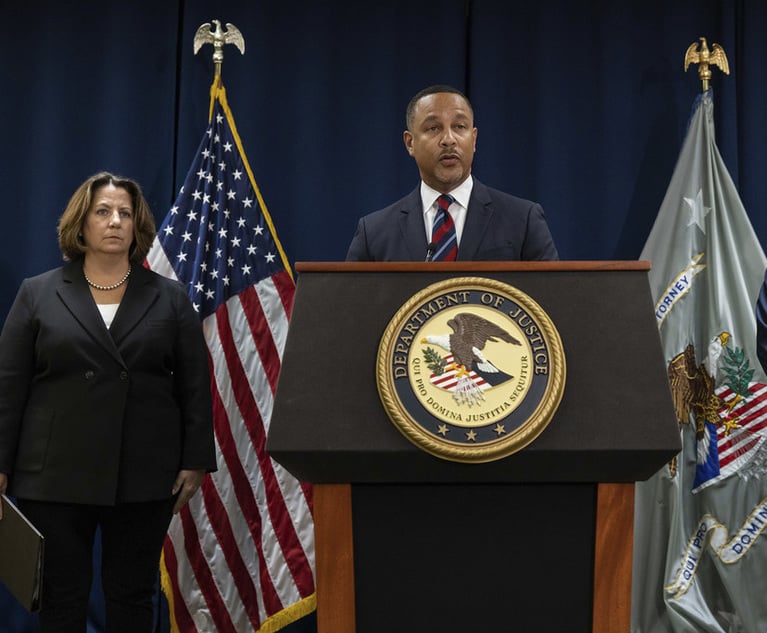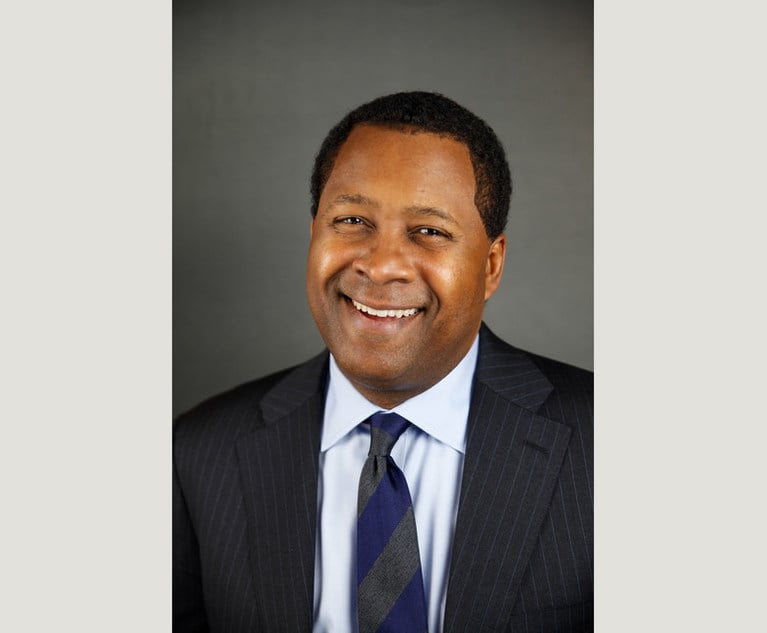Compliance Hot Spots: DOJ Defends FTC Staff Advisory Opinions | Tax Law Spurs Law Firm Work | Cannabis Lobbying Blitz | All the New Moves
The US Justice Department is urging the Supreme Court to turn down a challenge to the informal agency guidance issued by FTC staff. Plus: the Trump administration's tax law has been a great boon for... lawyers. Scroll down for our epic moves list. Thanks for reading!
February 12, 2019 at 09:00 PM
8 minute read
Welcome to Compliance Hot Spots, our weekly look regulatory and white-collar enforcement. Thanks for reading—and please continue to send feedback. I appreciate hearing from you about what's on your plate—observations, trends, new clients. I'm at [email protected] and 202-828-0315, or follow me on Twitter @cryanbarber.
SG's Office Defends FTC Staff Advisory Opinions
The U.S. solicitor general's office is urging the U.S. Supreme Court not to take up a case that confronts the reach of the informal advisory opinions issued by Federal Trade Commission staff. At issue is an FTC staff advisory letter, issued in 2016, that addressed deceptive and abusive telemarketing practices.
An industry trade association challenged the letter as an unlawful attempt to regulate without going through all the hoops and hurdles of the notice-and-comment process. The U.S. Court of Appeals for the D.C. Circuit in April rejected the challenge, brought by the Soundboard Association, a trade group that comprises companies using technology to facilitate “interactive, voice-assisted communication over the telephone.” The appeals court concluded the the FTC's letter was not “final agency action.” Case dismissed.
Not so fast. The Soundboard Association, represented by Karen Donnelly of the Kansas City, Missouri, firm Copilevitz & Canter, filed a petition for review in the Supreme Court in November. Donnelly wrote in her petition: “Do business owners have a right to immediate judicial review of an agency's self-described 'staff advisory opinion' that sets forth a new rule and a compliance mandate that chills speech and destroys businesses?”
The Trump-era Justice Department has shown no love for “guidance documents” that, according to business advocates, serve to sidestep the rulemaking process.
“Guidance documents can be used to explain existing law,” Rachel Brand, then the associate attorney general, said in 2017. “But they should not be used to change the law or to impose new standards to determine compliance with the law.”
The Justice Department might not like these documents, but Noel Francisco, the U.S. solicitor general, has asked the justices to turn down the Soundboard Association's petition. FTC staff opinions “are not approved by the commission, do not require a vote and do not provide a safe harbor.”
Francisco wrote in the government's brief:
“The purpose of informal staff guidance is to help regulated businesses shape their behavior without the need for protracted litigation. Yet any agency advice, no matter how informal, is likely to have some effect on the conduct of regulated entities, or else those parties would have no reason to seek the advice. If that potential effect were sufficient to make informal and nonbinding staff advice reviewable, '[n]ot only might staff be less willing to give advice, the advice that is released may take longer and be more costly to develop.'”
The Soundboard Association's case has caught some attention from business groups. The U.S. Chamber of Commerce, represented by Ruthanne Deutsch of Deutsch Hunt PLLC, warned of consequences for regulated parties should the D.C. Circuit decision stand. “The D.C. Circuit's decision imperils that interest by providing a roadmap for agencies to evade judicial review,” Deutsch wrote in an amicus brief.
“Under that ruling, even when staff 'advice' consists of unambiguous, industry-wide legal pronouncements, sets a strict compliance date for businesses to shut down, and threatens substantial consequences for failure to comply, an agency can still escape judicial review,” Deutsch wrote. “How? All an agency need do is authorize staff to issue the rule, disclaim finality with boilerplate language, and provide a hortatory promise that it might later change its mind—even though no further agency review is contemplated, and the administrative process, short of enforcement, is over.”
Deutsch predicted the D.C. Circuit decision “will have ripple effects across other agencies, and likely be replicated across other courts, unless and until this court acts to clarify the law.”
Compliance Headlines: What Caught My Eye
>> “Trump Tax Law Spurs Job Creation…for Tax Lawyers and Accountants.” “In 2017, Congress passed the Tax Cuts and Jobs Act. Many of the jobs it is creating, it turns out, are in the tax industry. The overhaul continues to generate thousands of jobs for tax professionals as companies analyze the law, restructure operations and rely on tax experts to do all the work flowing from the legislation and IRS regulations.”[WSJ]
>> “Mnuchin's team dwindles amid exodus from Treasury.” Among the nominees and other vacancies: Michael Desmond for IRS chief counsel. “President Donald Trump's Treasury Department is increasingly short-handed these days. The massive agency, which oversees everything from the nation's debt to international sanctions, is supposed to have 16 top officials in the core of the department who have been vetted by the Senate. It could soon have as few as six.” [Politico]
>> “Crypto Lobbying Doubles as Industry Seeks Washington Friends.” “Crypto and blockchain-related congressional lobbying took off in 2018 as some of the industry's top players realized they should go to Washington before Washington comes for them.”[Bloomberg Law]
>> “SEC, DOJ May Suffer Lingering Effects From Recent Federal Government Shutdown.” From my colleague MP McQueen: “The record federal government shutdown that affected 800,000 employees—which could resume Feb. 15—may have lingering effects at the U.S. Securities and Exchange Commission and the Department of Justice, as well as a long-term impact on hiring and retention at enforcement agencies, some white-collar attorneys said.”[NLJ]
>> “Inside the Alcohol Industry's Lobbying Blitz on Cannabis.” Cannabis advocacy is flourishing in the halls of the U.S. Capitol, where U.S. House Democrats this week will convene the first-ever hearing looking at the marijuana industry's access to banking. Not to be left out of the conversation: trade groups representing some of the biggest brands on the shelves. Alcohol industry groups are asserting their voices ever more on cannabis issues as lawmakers address whether and how to embrace the regulatory schemes that are in place for booze. Alcohol industry lobbyists say their mission is more educational than confrontational—especially as major spirits companies look for investment opportunities in the green wave.[Law.com]
>> “Does Artificial Intelligence Need a General Counsel? Management in the Age of AI.” From Alan Brill, a senior managing director in Kroll's cyber risk unit, and Elaine Wood, a managing director at Duff & Phelps:”If AI systems are to succeed, the general counsel must have a seat at the table at which decisions about AI systems are being made. Without the input of legal and compliance specialists, the risk of a rogue system to an organization's operations and reputation may be too high.” [Legaltech News]
Notable Moves and Announcements
>> Securities lawyer Randall Lee (above) has joined Cooley as a partner in Los Angeles. He jumped from Wilmer Cutler Pickering Hale and Dorr, where he founded the firm's LA office and served as the partner-in-charge. My colleague Xiumei Dong has more here on Lee's move to Cooley. “The combination of an increasingly prominent litigation practice, combined with a phenomenal corporate practice and a huge California footprint represents an exceptional platform for my practice and for what I do,” Lee said, explaining his move.
>> Wilson Sonsini Goodrich & Rosati has hired Jeffrey Lehtman as partner in the firm's government investigations practice in Washington, D.C. Lehtman joins from Richards Kibbe & Orbe, where he was co-chair of the litigation department.
>> “The House Financial Services Committee is hiring a Senate lawyer with deep experience conducting complex investigations to help run its upcoming probe of Deutsche Bank AG, according to people briefed on the matter,” Bloomberg reports. Bob Roach ”has spent more than two decades digging into dubious banking practices from his former perch with the Senate's Permanent Subcommittee on Investigations. Few prominent Wall Street firms have been left untouched by his work.”
>> Anthony Pacheco has joined Vedder Price as a shareholder in the firm's government enforcement and special investigations practice group in Los Angeles. Pacheco earlier served as chair of the white-collar defense and investigations team at Jeffer Mangels Butler & Mitchell.
>> King & Spalding has appointed Richard Fields, a former white-collar litigator at Ropes & Gray, as director of corporate stakeholder engagement, a new position formed in response to the growing pressures on corporate boards in an era of fervent shareholder activism, my colleague Michael Washburn reports.
This content has been archived. It is available through our partners, LexisNexis® and Bloomberg Law.
To view this content, please continue to their sites.
Not a Lexis Subscriber?
Subscribe Now
Not a Bloomberg Law Subscriber?
Subscribe Now
NOT FOR REPRINT
© 2025 ALM Global, LLC, All Rights Reserved. Request academic re-use from www.copyright.com. All other uses, submit a request to [email protected]. For more information visit Asset & Logo Licensing.
You Might Like
View All
Compliance Hot Spots: GOP Eyes ESG as an Antitrust Issue + Another DOJ Crypto Seizure + Sidley Partner Jumps to Main Justice
9 minute read
Compliance Hot Spots: Lessons from Lafarge + Fraud Section Chief Talks Compliance + Cravath Lands FTC Commissioner
11 minute readTrending Stories
Who Got The Work
J. Brugh Lower of Gibbons has entered an appearance for industrial equipment supplier Devco Corporation in a pending trademark infringement lawsuit. The suit, accusing the defendant of selling knock-off Graco products, was filed Dec. 18 in New Jersey District Court by Rivkin Radler on behalf of Graco Inc. and Graco Minnesota. The case, assigned to U.S. District Judge Zahid N. Quraishi, is 3:24-cv-11294, Graco Inc. et al v. Devco Corporation.
Who Got The Work
Rebecca Maller-Stein and Kent A. Yalowitz of Arnold & Porter Kaye Scholer have entered their appearances for Hanaco Venture Capital and its executives, Lior Prosor and David Frankel, in a pending securities lawsuit. The action, filed on Dec. 24 in New York Southern District Court by Zell, Aron & Co. on behalf of Goldeneye Advisors, accuses the defendants of negligently and fraudulently managing the plaintiff's $1 million investment. The case, assigned to U.S. District Judge Vernon S. Broderick, is 1:24-cv-09918, Goldeneye Advisors, LLC v. Hanaco Venture Capital, Ltd. et al.
Who Got The Work
Attorneys from A&O Shearman has stepped in as defense counsel for Toronto-Dominion Bank and other defendants in a pending securities class action. The suit, filed Dec. 11 in New York Southern District Court by Bleichmar Fonti & Auld, accuses the defendants of concealing the bank's 'pervasive' deficiencies in regards to its compliance with the Bank Secrecy Act and the quality of its anti-money laundering controls. The case, assigned to U.S. District Judge Arun Subramanian, is 1:24-cv-09445, Gonzalez v. The Toronto-Dominion Bank et al.
Who Got The Work
Crown Castle International, a Pennsylvania company providing shared communications infrastructure, has turned to Luke D. Wolf of Gordon Rees Scully Mansukhani to fend off a pending breach-of-contract lawsuit. The court action, filed Nov. 25 in Michigan Eastern District Court by Hooper Hathaway PC on behalf of The Town Residences LLC, accuses Crown Castle of failing to transfer approximately $30,000 in utility payments from T-Mobile in breach of a roof-top lease and assignment agreement. The case, assigned to U.S. District Judge Susan K. Declercq, is 2:24-cv-13131, The Town Residences LLC v. T-Mobile US, Inc. et al.
Who Got The Work
Wilfred P. Coronato and Daniel M. Schwartz of McCarter & English have stepped in as defense counsel to Electrolux Home Products Inc. in a pending product liability lawsuit. The court action, filed Nov. 26 in New York Eastern District Court by Poulos Lopiccolo PC and Nagel Rice LLP on behalf of David Stern, alleges that the defendant's refrigerators’ drawers and shelving repeatedly break and fall apart within months after purchase. The case, assigned to U.S. District Judge Joan M. Azrack, is 2:24-cv-08204, Stern v. Electrolux Home Products, Inc.
Featured Firms
Law Offices of Gary Martin Hays & Associates, P.C.
(470) 294-1674
Law Offices of Mark E. Salomone
(857) 444-6468
Smith & Hassler
(713) 739-1250













